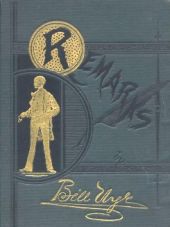Remarks
by Bill Nye

A Colorado burro has been shipped across the Atlantic and presented to the Prince of Wales. It is a matter of profound national sorrow that this was not the first American jackass presented to his Tallness, the Prince.
At Omaha last week a barrel of sauer kraut rolled out of a wagon and struck O’Leary H. Oleson, who was trying to unload it, with such force as to kill him instantly and to flatten him out like a kiln-dried codfish. Still, after thousands of such instances on record, there are many scientists who maintain that sauer kraut is conducive to longevity.
As an evidence of the healthfulness of mountain climate, the people of Denver point to a man who came there in ’77 without flesh enough to bait a trap, and now he puts sleeves in an ordinary feather-bed and pulls it on over his head for a shirt. People in poor health who wish to communicate with the writer in relation to the facts above stated, are requested to enclose two unlicked postage stamps to insure a reply.
At Ubet, M.T., during the cold snap in January, one of the most inhuman outrages known in the annals of crime was perpetrated upon a young man who went West in the fall, hoping to make his pile in time to return in May and marry the New York heiress selected before he went.
While stopping at the hotel, two frolicsome young women hired the porter to procure the young man’s pantaloons at dead of night They then sewed up the bottoms of the legs, threw the doctored garment back through the transom and squealed “Fire!”
When he got into the hall he was vainly trying to stab one foot through the limb of his pantaloons while he danced around on the other and joined in the general cry of “Fire!” The hall seemed filled with people, who were running this way and that, ostensibly seeking a mode of egress from the flames, but in reality trying to dodge the mad efforts of the young man, who was trying to insert himself in his obstinate pantaloons.
He did not tumble, as it were, until the night watchman got a Babcock fire extinguisher and played on him. I do not know what he played on him. Very likely it was, “Sister, what are the wild waves saying?”
Anyway, he staggered into his room, and although he could hear the audience outside in their wild, tumultuous encore, he refused to come before the curtain, but locked his door and sobbed himself to sleep,
How often do we forget the finer feelings of others and ignore their sorrow while we revel in some great joy.
“We.”
The world is full of literary people to-day, and they are divided into three classes, viz: Those who have written for the press, those who are writing for the press, and those who want to write for the press. Of the first, there are those who tried it and found that they could make more in half the time at something else, and so quit the field, and those who failed to touch the great heart and pocketbook of the public, and therefore subsided. Those who are writing for the press now, whether putting together copy by the mile within the sound of the rumbling engine and press, or scattered through the country writing more at their leisure, find that they have to lay aside every weight and throw off all the incumbrances of the mossy past.
One thing, however, still clings to the editor like a dab of paste on a white vest or golden fleck of scrambled egg on a tawny moustache. One relic of barbarism rears in gaunt form amid the clash and hurry and rush of civilization, and in the dazzling light of science and smartness.
It is “we.”
The budding editor of the rural civilizer for the first time peels his coat and sharpens his pencil to begin the work of changing the great current of public opinion. He is strong in his desire to knock error and wrong galley west. He has buckled on his armor to paralyze monopoly and purify the ballot He has hitched up his pantaloons with a noble resolve and covered his table with virgin paper.
He is young, and he is a little egotistical, also. He wants to say, “I believe” so and so, but he can’t. Perspiration breaks out all over him. He bites his pencil, and looks up with his clenched hand in his hair. The slimy demon of the editor’s life is there, sitting on the cloth bound volume containing the report of the United States superintendent of swine diseases.
Wherever you find a young man unloading a Washington hand press to fill a long-felt want, there you will find the ghastly and venomous “we,” ready to look over the shoulder of the timid young mental athlete. Wherever you find a ring of printer’s ink around the door knob, and the snowy towel on which the foreman wipes the pink tips of his alabaster fingers, you will find the slimy, scaly folds of “we” curled up in some neighboring corner.
From the huge metropolitan journal, whose subscribers could make or bust a president, or make a blooming king wish he had never been born, down to the obscure and unknown dodger whose first page is mostly electrotype head, whose second and third pages are patent, whose news is eloquent of the dear dead past, whose fourth page ushers in a new baby, or heralds the coming of the circus, or promulgates the fact that its giant editor has a felon on his thumb, the trail of the serpent “we” is over them all. It is all we have to remind us of royalty in America, with the exception, perhaps, of the case now and then where a king full busts a bob-tail flush.
 Continue...
Continue...![[Buy at Amazon]](../images.amazon.com/images/P/B000875S1G.01.MZZZZZZZ.gif)